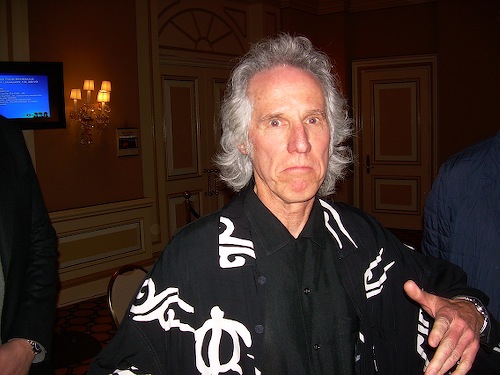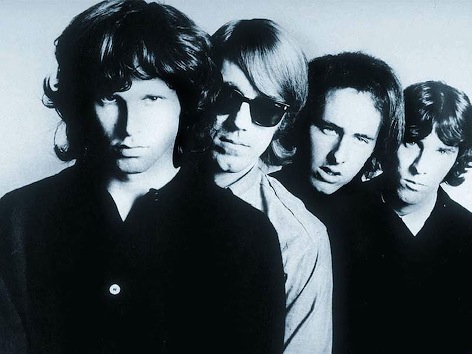A new window on The Doors in a striking American Masters film
05/11/10 03:46 PM

By ED BARK
Many of us played The Doors' first LP to death well before lead singer Jim Morrison self-destructed.
It skipped, popped and crackled from repeated use while Morrison bent and finally broke from constant abuse.
PBS' latest American Masters presentation, When You're Strange: A Film About The Doors, can't help but be mostly about Morrison, who died in a Paris bathtub in 1971 at age 27. Problem is, he never dried out. Estranged from his parents and eventually from his bandmates, too, Morrison remains a larger enigma than any of the others of his era who died young and still live on. Morrison, Jimi Hendrix and Janis Joplin all expired at the same age in less than a 10-month span. Sex, drugs and rock 'n' roll. Over and out.
"To some, Jim was a poet, his soul trapped between heaven and hell," narrator Johnny Depp says near the end of the 90-minute When You're Strange (Wednesday May 12th, 9 p.m. on KERA13). "To others he was just another rock star who crashed and burned. But this much is true. You can't burn out if you're not on fire."
That sounds good, even if it's not really true. It also jibes with The Doors' "Light My Fire," their first hit and everlasting anthem. Morrison wailed it, and Ray Manzarek took an enduring solo flight on the keyboards while drummer John Densmore and the song's writer, lead guitarist Robby Krieger, kept pace and collected the same $50,000 individual royalty check after the song hit No. 1 on the pop charts.
When You're Strange, drawn entirely from period footage, is one of the best and most imaginative American Masters presentations in quite some time. There are no new interviews or reminiscences. It's more than enough to just see The Doors as themselves, onstage, backstage and in the studio.
The film's writer/director, Tom DiCillo, got an assist from Law & Order creator Dick Wolf, who as a co-producer helped enlist Depp as narrator while also shepherding the project to PBS. DiCillo did the voiceover for an earlier screening at the Sundance Film Festival. But Depp adds his own brand of sinewy narrative muscle while also personalizing the film via the simple decision to call all of The Doors by their first names.
Wolf, during a January session with TV critics, termed it "a magnificent shift in the emphasis of the film from being a true documentary and one step removed to (being) personalized and empathetic. And that's something you can't buy."
Densmore, now 65 and still playing music with a band called Tribaljazz, said the remaining members of The Doors made two albums after Morrison's death before collectively asking themselves, "What are we doing? Our focal point is gone. This is not The Doors. Goodbye. We had played together for so long we didn't want to give up the musical synchronicity. But oh, without that spearhead in the front, you know . . ."
His voice trailed off. Densmore said he sees Morrison's death through a different prism with the passage of time.
"Creativity sometimes comes in the same package with self-destruction," he said. "It doesn't have to. Picasso lived to 90. In Jim's case, 27 was it. As the years go by, the more I feel that it was just his destiny to have this quick shooting star and make a big impact. And it's all tangled up, you know, his self-destruction."

Densmore is a fan -- but Manzarek is not, he said -- of Oliver Stone's 1991 movie about The Doors. He had a bit part near the end as a recording engineer.
Val Kilmer's portrayal of Morrison "gave me the creeps on the set," Densmore recalls. "He was so Morrison-like. I mean, I love Oliver for giving it a go . . . I mean, it's excessive. Oliver says, 'If you don't like my foot on your chest, don't go see my movies.' So I like it. Ray went to film school, so he doesn't like it."
Densmore has seen When You're Strange "a zillion times." Not surprisingly, he likes the early parts. "You see a young Jim, and that pleases me. Because he was a blast in the beginning, before his self-destruction kicked in. . . It's some kind of beautiful dream I had, and now here it is right there on the screen again."
When You're Strange also shows the disintegration, with Morrison eventually charged and convicted of profanity and indecent exposure onstage. The Doors had become a "dirty and dangerous band" in the eyes of some, with crowds massing to see Morrison go crazy rather than groove on the music. He regularly complied, once proclaiming onstage, "I wanna have my kicks before the whole shithouse goes up in flames!"
Two well-reviewed and commercially successful albums, Morrison Hotel and L.A. Woman, were still on the horizon, though, before Morrison abruptly quit the band, headed to Paris, developed a persistent cough and died. His father, a stern Navy admiral, had told his son in a letter that he had no talent at all for singing. A decade after the singer's death, he steeled himself to admit, "My son had a unique genius, which he expressed without compromise."
I saw The Doors once, in San Diego while still in the Marines. The staged was ringed with uniformed police officers. At one point Morrison used his long microphone cord as a noose that he dangled within the vicinity of several cops' necks. The house lights came up and the concert was temporarily stopped. Morrison screamed a hard-core profanity before the show was allowed to resume. No one wanted a riot. Well, maybe Morrison did.
"Jim relishes the attention," Depp says during When You're Strange. "He seems to have been born instantly ready for fame. Everything he does seems either brilliant or brilliantly calculated for effect."
Or maybe he was just a narcissistic drunk with stage presence and a singular voice.
GRADE: A
